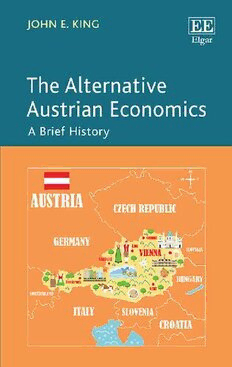
The Alternative Austrian Economics: A Brief History PDF
Preview The Alternative Austrian Economics: A Brief History
The Alternative Austrian Economics KING_9781788971508_t (col).indd 1 13/11/2019 13:20 KING_9781788971508_t (col).indd 2 13/11/2019 13:20 The Alternative Austrian Economics A Brief History John E. King Emeritus Professor, La Trobe University, Australia and Honorary Professor, Federation University Australia Cheltenham, UK • Northampton, MA, USA KING_9781788971508_t (col).indd 3 13/11/2019 13:20 © John E. King 2019 All rights reserved. No part of this publication may be reproduced, stored in a retrieval system or transmitted in any form or by any means, electronic, mechanical or photocopying, recording, or otherwise without the prior permission of the publisher. Published by Edward Elgar Publishing Limited The Lypiatts 15 Lansdown Road Cheltenham Glos GL50 2JA UK Edward Elgar Publishing, Inc. William Pratt House 9 Dewey Court Northampton Massachusetts 01060 USA A catalogue record for this book is available from the British Library Library of Congress Control Number: 2019951577 This book is available electronically in the Economics subject collection DOI 10.4337/9781788971515 ISBN 978 1 78897 150 8 (cased) ISBN 978 1 78897 151 5 (eBook) Typeset by Servis Filmsetting Ltd, Stockport, Cheshire 2 0 KING_9781788971508_t (col).indd 4 13/11/2019 13:20 Contents List of figures vi List of acronyms vii 1 Introduction 1 2 ‘Red Vienna’ and the roots of Austro-Marxism 7 3 The young Rudolf Hilferding 22 4 Otto Bauer 1904–14 40 5 The economics of socialism 59 6 Otto Bauer 1917–38 79 7 Other voices 96 8 The heirs: I. Josef Steindl 115 9 The heirs: II. Kurt Rothschild 134 10 What is left? 153 Bibliography 170 Name index 209 Subject index 214 v KING_9781788971508_t (col).indd 5 13/11/2019 13:20 Figures 7.1 Occupational distribution of men and women in 1910 and 1923 104 7.2 Women’s unemployment by industry and occupation 105 7.3 Women’s unemployment by age group 106 7.4 Women’s sleeping arrangements in private and public housing 107 7.5 Number of children by age of working mother 108 7.6 Forms of child care provision 109 vi KING_9781788971508_t (col).indd 6 13/11/2019 13:20 Acronyms ALÖS Foreign Office of Austrian Socialists BEIGEWUM Beirat für gesellschafts-, wirtschafts- und umweltpolitische Alternativen (Advice on Social, Economic and Environmental Alternatives) GATT General Agreement on Tariffs and Trade HM historical materialism NOeG National Economic Society (Austria) OECD Organisation for Economic Co-operation and Development OeNB Austrian National Bank SDP Social Democratic Party (Austria) SPD Sozialdemokratische Partei Deutschlands (Social Democratic Party, Germany) USPD Independent Socialist Party (Germany) VUEBA Vienna University of Economics and Business Administration WIFO Österreichisches Institut für Wirtschaftsforschung (Austrian Institute of Economic Research) wiiw Vienna Institute for International Economic Studies WIWIPOL Arbeitsgemeinschaft für wissenschaftliche Wirtschaftspolitik (Foundation for Scientific Economic Policy) WTO World Trade Organization WU Vienna University of Economics and Business WUT Vienna University of Technology WZB Wissenschaftszentrum (Social Science Centre, Berlin) vii KING_9781788971508_t (col).indd 7 13/11/2019 13:20 KING_9781788971508_t (col).indd 8 13/11/2019 13:20 1. Introduction I will never forget my first sight of Austria. It was the late summer of 1965, and I was hitch-hiking eastwards through the southern edge of what was then West Germany. As the Austrian border approached I was overwhelmed by the range of rugged, snow-capped mountains that lay just behind my destination, the city of Salzburg. As a Londoner born and bred, who had not yet been seriously north of Watford, I had never seen anything like it. I vowed to return, and have done so frequently ever since, for the first quarter of a century solely as a tourist and mountain walker and subsequently also with more academic objectives in mind. But I had already in 1965 begun to take an interest in one dissident Austrian economist, Kurt Rothschild, whose work had been recommended to me by my Oxford economics tutor. Later, when Mike Howard and I began to work on the history of Marxian economics, I worked to improve my schoolboy-cum-tourist German and put it to good use, acquainting myself with the early work of Otto Bauer and Rudolf Hilferding and the later writings of Josef Steindl, who had influenced the Monopoly Capital school of American Marxism. By now it had begun to dawn on me that these heterodox scholars, and others whose names were cropping up in a variety of contexts, had something in common. They did not quite constitute a single coherent school of thought, but they were certainly more than a col- lection of independent near-neighbours: an intellectual tradition, at least, could be detected, even if it seemed to have gone largely unrecognised in the English-speaking world. For almost everyone with even a passing interest in the subject, ‘Austrian economics’ refers to a distinct school of thought, originating with Ludwig von Mises and Friedrich von Hayek, that is characterised by a strong com- mitment to an extreme form of free-market liberalism. Those who have gone further into these questions understand that Austrian economists are also united in their indifference or hostility to formal modelling and the use of econometric techniques. These issues place the Austrian school in a rather ambivalent position in the global economics discipline. Politically, the rise of neoliberalism – which it encouraged and helped to bring about – has thrust market deregulation, privatisation and a greatly restricted economic role for the state deep into the heart of the economics profession. 1 KING_9781788971508_t (col).indd 1 13/11/2019 13:20
